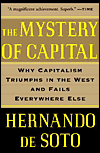|

From the Publisher
"The hour of capitalism's greatest triumph" writes Hernando de Soto, "is, in the eyes of four-fifths of humanity, its hour of crisis." In The Mystery of Capital, the world-famous Peruvian economist takes up the question that, more than any other, is central to one of the most crucial problems the world faces today: Why do some countries succeed at capitalism while others fail?
In strong opposition to the popular view that success is determined by cultural differences, de Soto finds that it actually has everything to do with the legal structure of property and property rights. Every developed nation in the world at one time went through the transformation from predominantly informal, extralegal ownership to a formal, unified legal property system. In the West we've forgotten that creating this system is what also allowed people everywhere to leverage property into wealth. This persuasive book revolutionizes our understanding of capital and points the way to a major transformation of the world economy.
Author Biography: Hernando de Soto is President of the Institute for Liberty and Democracy (ILD), headquartered in Peru and regarded by The Economist as the second most important think-tank in the world. He was recently named one of the five leading Latin American innovators of the century by Time. As Personal Representative and Principal Advisor to the President of Peru, he initiated that country's economic and political reforms. His previous book, The Other Path: The Economic Answer to Terrorism, was a bestseller throughout Latin America as well as in Washington, D.C. More information on de Soto and the ILD can be found at www.ild.org.pe.
Highlights:
On Dead Capital
"Assets in developing and former communist countries primarly serve these immediate physical purpose. In the West, however, the same assets also lead a parallel life as capital outside the physical world. (...) Why can't buildings and land elsewhere in the world also lead this parallel life? (...) USD 9.3 trillion of dead capital (...)"
"(..) Dead capital exist because we have forgotten (...) that converting a physical asset to generate capital - using your house to borrow money to finance an enterprise - requires a very complex process. (...) Why assets can be made to produce abundant capital in the West but very little in the rest of the world is a mystery."
On the Hidden Conversion Process in the West
1) Fixing the Economic Potential of Assets
2) Intergrating Dispersed Information into One System
3) Making People Accountable
4) Making Assets Fungible
5) Networking People
6) Protecting Transactions
As an example to illustrate point 2):
Property Procedures in Egypt and the Philippines
On Property and Capital
"A well-integrated legal property system does two things: First, it tremendously reduces the costs of knowing the economic qualities of assets by representing them in a way that our senses can pick up quickly; and second, it facilitates the capacity to agree on how to use assets to create further production and increase the division of labor. The genius of the West was to have created a system that allowed people to grasp with the mind values that human eyes could never see and to manipulate things that hands could never touch."
"The only way to touch capital is if the propoerty system can record its economic aspects on paper and anchor them to a secific location and owner."
"The connection between capital and modern money runs trough property."
On the Emergence of Extralegality
"Authorities and legal businessmen were not as impressed with the competition as Adam Smith. In England, during the decades following the restoration of the monarchy in 1660, some traditionalists began to complain about the growing numbers of peddlers and street vendors, the disturbance that took place in front of established shops, and the appearance of new shopkeepers in many small cities. Formal traders tried in vain to get rid of the newcomers. In Paris, the legal battle between tailors and second-hand-clothes dealers went on for more than three hundred years. It was stopped only by the French Revolution."
In the mid-eghteenth century, laws prohibiting the French public from manufacturing, importing, or selling cotton prints carried penalties ranging from slavery and imprisonment to death. (..) Within one ten-year period in the eighteenth century the French executed more than 16'000 smugglers and clandestine manufacturers for the illegal manufacture or import of printed calicoes."
"The state relied heavily on the guilds - whose main function was to control access to legal enterprise - to help identify lawbreakers. But by making the laws more stringent instead of adjusting them to include extralegal manufacturing, the authorities simply forced entrepreneurs to the extralegal suburbs."
"Eventually, extralegal competition increased to the point that formal business owners had no alternative but to subcontract part of their production to suburban workshops - narrowing the tax base and causing taxes to rise.(...) European governments were gradually forced to retreat in the face of growing extralegality."
On the U.S. Experience
"In passing laws to integrate the extralegal population, American politicians expressed the revolutionary idea that legal institutions can survive only if they respond to social needs. The American legal system obtained its energy because it built on the experience of grassroots Americans and the extralegal arrangements they created, while rejecting those English common law doctrines that had little relevance to the problems unique to the United States.
In the long and arduous process of iontegrating extralegal propoerty rights , American legislators and jurists created a new system much more conductive to a productive and dynamic market economy."
On Formal Property in Developing Countries
(...) pretending extralegal arrangements do not exist or trying to stamp them out, without a strategy to channel them into the legal sector, is a fool's errand.(...) How can a legal system aspire to legitimacy if it cuts out 80 percent of its people?"
"What keeps most people in developing and former communist nations from using modern formal property to create capital is a bad legal and administrative system."
| 


